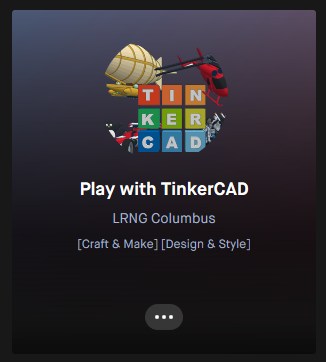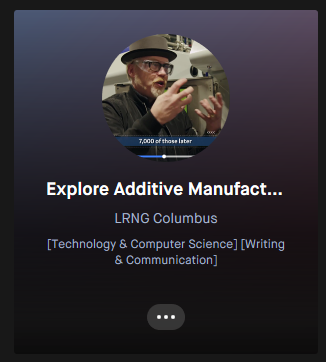Course 1: Introduction to the Innovation Economy
The innovation economy has changed the language of everyday work and exchange. It's also put powerful tools into the hands of ordinary people.
Speaking the language of the this economy grows ever more complex. Business ideas meld with artistic terms, entire new fields of technology emerge every couple years, economics basics get muddled amongst the new fads.
By choosing modules (pathways), students will advance rapidly in a general understanding of business basics, micro-economics, entrepreneurship, and emerging practical technology.
Playlists
Local (Columbus) Networking Opportunities
- Join & Explore MeetUp.com
- Take a Workshop Interest Tour at Idea Foundry
- Play with Hardware at a CARPE Arduino Raspberry Pi Meetup
- Attend WakeUp StartUp
- Cyber Ohio Capture the Flag Challenge 2018
- Startup Weekend Columbus, powered by Grow with Google
- Start Your Youth Biomimicry Challenge Team
- Join the TechLife Columbus Online Community
Play & Learn With New Tech Online
- Create A Dinosaur Skin (Pixar in a Box)
- Try Graphical Coding and Studio.code.org
- Rockets and Spacecraft -- Lets go to _______!!
- Create a user Persona with RealTimeBoard
- Start A Virtual Reality Game with Unity 3D
- What is GitHub? Who Would Use It to Do What?
- Try GIT
- Learn Blockchains by Building One (test XP)
- Level Up Your Graphical Coding on Studio.code.org
- Lens Studio: Getting Started
- Lens Studio: Find Your Static Spirit Animal
- Test Out the Autodesk A360 3D Cad Viewer
- Create A Web Page With Thimble
- Mash Up an Air Force lab video
- Play the Biomimicry Memory Match Game
Design, Products, Process
Getting Help
Finding New Learning Options
The Innovation Economy isn't just about technologies and tools, though. It's also about, well, the economy. Business. Leadership. Playlists for these should be included, too.Of course, XP's and playlists developed by other orgs will fit in the coursework:
- Cyber Security: Hacking and Privacy
- Conquer the Fear of Making (LRNG/inovation-lab)
- I Wanna Work in Video Games (LRNG/Glass Lab Games)
- Apprenticeship Sprints LRNG/Orlando | Playground City.
- Arduino Starter Kit: Noob Status (LRNG/PlaygroundCity)
- Start up Funding for Entrepreneurs (LRNG/Cycles and Sprouts)
- What's the Biz? (LRNG/Cycles and Sprouts)
- Name that Brand (LRNG/Cycles and Sprouts)
- Make an Impact AND a Profit (LRNG/Cycles and Sprouts)
- Prototype Power (LRNG/Cycles and Sprouts)
- You say tomato, I say ENTREPRENEUR (LRNG/Cycles and Sprouts)
- Ideation Station (LRNG/Cycles and Sprouts)
And some we're working on:
- Sculpt A Model in HDU Foam
- Create an Alexa Skill
- Scour Data from the Web With Scrapy
- Test Out the Autodesk A360 3D Cad Viewer
- How Does Overnight Shipping Work?
- Make A Fidget With TinkerCAD
- Create A Web Page With Thimble
- Create an Alexa Skill with Storyline
- What is BioMimicry?
- Try 3-D Sensing with
- Explore Robotic Process Automation





